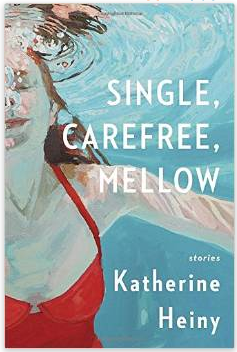I did my hair mirror-image today (parted it on the opposite side, put the bun on the opposite side) and the whole thing is surprisingly unsettling.
I have a book to recommend, with a warning and an anti-warning. First, here is the book:
Single, Carefree, Mellow, by Katherine Heiny. I don’t want to speak too highly of it, because the way I read it seemed IDEAL: I saw it on the shelf, rejected it, but then someone else recommended it and I requested it from the library without realizing it was one I rejected. So then I thought, “Fine. I’ll try it.” And I liked it SO MUCH. I kept wanting to get back to reading it. I wanted there to be LOTS MORE OF IT. I wanted to have discovered it LATER, when the author had multiple books, instead of NOW when this is her only one.
Here is the warning: some people don’t like to read stories about affairs. And pretty much the whole book is about affairs. In some stories, a woman is cheating on her husband or boyfriend; in other stories, the woman is seeing someone else’s husband; in some stories, it’s both. I thought the whole thing was handled extremely well, and I read about the different perspectives with great interest. With the full realization that I could be 100% wrong, I concluded the following things about the author: that the author had affairs with married men when she was younger and unmarried; that her husband was one of those affairs, and that he left his wife and family for her; that since then she has either had an affair or has imagined having them; that the author is a smart and sensible person, with a calm streak I admire—or else she too admires people with a calm streak, and so put that into her characters.
At least two of the stories are written in second person (“You go to school every day, but you don’t feel as if you…”), which I just hate. I mean, I just HATE it. It triggers an automatic argumentative response in my brain: “NO. No, I did NOT. STOP TELLING ME I DID WHAT I DIDN’T DO.” I had to think of them as being written by the character’s future self, telling her how it’s going to happen for her. Even so, I was very relieved when most of the stories were first-person (“I brushed my hair and thought about what I…”) or third-person (“Maya went to the library where she…”).
There were a couple of places where I wasn’t sure if the author was saying something Knowingly or Obliviously. In one, the main character, who is having an affair with another woman’s husband, thinks that the wife doesn’t really know the husband, because she (the wife) said something without realizing it would make the husband mad. Whereas I, reading it, thought, “OH SHE KNEW ALL RIGHT.” In another part, the married mistress protests a man’s previous mistress, saying “But she has a double chin!”—and the man has the grace to look ashamed. Are my feelings hurt by the author’s obliviousness/idiocy, or is that supposed to be a slam on the mistress’s obliviousness/idiocy?
The anti-warning is that you may be tempted to reject the book because it’s short stories. That was one of my original reasons for rejecting it: I don’t like that JUST as I’m getting to know and love the characters, it’s over. This book, although it IS short stories and so can’t avoid producing that response in me, felt more pulled together: because there was a common theme, and because at least one of the characters had several stories about her, it was somewhere between short stories and a novel.


Nice! I have been gazing at the cover the last few trips to the bookstore. I’ve been exploring more short stories this year, too! I am a big fan of Ramona Ausubel’s A Guide for Being Born. Second place to Diane Cook’s Man v. Nature. Both of them deal with motherwood in somewhat magical ways.
As soon as I understood this to be short stories, my brain went “NOPE!” but I kept reading your post out of curiosity. When you mentioned your aversion to short stories, I immediately put this in my “books to read” spreadsheet. (Yes, I have a spreadsheet. There are so many books. It is physically impossible for me to read them all before I’m 100.)
A spreadsheet is a great idea. I’d have a column for “Why is this on my list?”/”Who recommended this to me?”
This is just to say I love your blog post title.
Me, too!
I am ambivalent about reading the book, but I’m wondering who the cover artist is (not sure if this info is found in/on books somewhere). I could swear I’ve seen and admired, if not that exact painting, paintings in that exact style. Maybe on Etsy…?
Oh shoot, I just returned it to the library. I tried searching online and it looks like it might be Samantha French.
Funny, I just did a search online and came up with the same name via an Etsy blog entry: https://blog.etsy.com/en/2013/featured-shop-samantha-french/
Just wanted to say, you so very eloquently put into words why *I* don’t do short stories. Not even for Stephen King.
Ohhhh I am interested. Your review makes me think it’s like a female author’s version of This is How You Lose Her, by Junot Diaz.